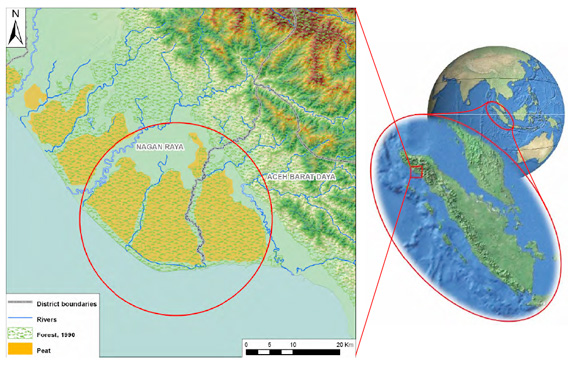Diana Parker, Mongabay-Indonesia correspondent
May 05, 2013
Court orders Aceh governor to reverse decision to cancel palm oil concession in protected peatlands
An Indonesian court has ruled in favor of plantation company PT Kallista Alam in a lawsuit brought against the governor of Indonesia’s Aceh province for revoking the company’s license to develop palm oil plantations in a protected peat swamp forest.
The Banda Aceh Administrative Court said the governor’s earlier decision to revoke the permit was not legally binding as the case that led to the permit’s cancellation was still being considered by Indonesia’s Supreme Court, Mongabay-Indonesia reported on Thursday.
The ruling is the latest development in an ongoing legal battle over a concession in Aceh’s Rawa Tripa peat swamp forest, which a local environmental group says violates the country’s two-year moratorium on new concessions in primary forests and peatlands. Former Aceh Governor Irwandi Yusuf issued the permit in August 2011, more than three months after the nation-wide moratorium went into effect.

Environmental groups opposed the 1,605-hectare concession, saying it not only violates the moratorium but also threatens the habitat of critically endangered Sumatran orangutans. The Aceh chapter of the Indonesian Forum for the Environment (Walhi) brought the case to court, and in August last year the Medan High Court ordered Aceh’s current governor, Zaini Abdullah, to revoke the permit.
Kallista Alam filed an appeal against the Medan court’s decision with the Indonesian Supreme Court. The company also filed a lawsuit against Governor Zaini Abdullah with the Banda Aceh Administrative Court over the revoking of the permit.
On Thursday a panel of judges at the Banda Aceh Administrative Court ruled in favor of the company and ordered the governor to revoke his earlier decision to cancel the permit, Atjehpost.com reported. The panel, led by Judge Yusri Arbi, said the governor must revoke his decision since the Medan High Court ruling that led to the permit’s cancellation was not legally binding as the Supreme Court has not yet ruled in the case.

Fire hotspots burning in a palm oil concession in Tripa on June 29th, 2012. (Courtesy of the Sumatran Orangutan Conservation Program/YEL).
The Aceh governor and Walhi’s Aceh branch, an intervening defendant in the case, both plan to appeal the court’s decision.
“The Aceh government’s stance is clearly to file an appeal because the governor’s decision to revoke the business permit of Kallista Alam was to follow the decision of Medan High Administrative Court,” the head of the Aceh government’s legal bureau Edrian told the Jakarta Globe on Friday, adding that a government investigation revealed that the company’s operations in Rawa Tripa had damaged the environment and caused conflicts with local residents.
Meanwhile Zaini’s attorney, Kamaruddin, said that the law makes it clear that the power to issue and revoke permits lies with the provincial government, Mongabay-Indonesia reported. By ordering the governor to revoke his decision, the judges handling the case at the Banda Aceh court showed they did not understand the relevant laws, Kamaruddin said.

Campaign run by a coalition of environmentalists opposing the conversion of Tripa peat swamp for Kallista Alam's oil palm plantation.
“We support the governor of Aceh in not yielding to actors who would destroy the environment,” Abetnego Tarigan, the executive director of Walhi’s national branch, said in a statement to the media on Friday. Walhi plans to appeal the decision as an intervening defendant, Abetnego said, adding that the group hopes the governor of Aceh will take the same legal action as part of the government’s commitment to protect the environment and its citizens.
|
|